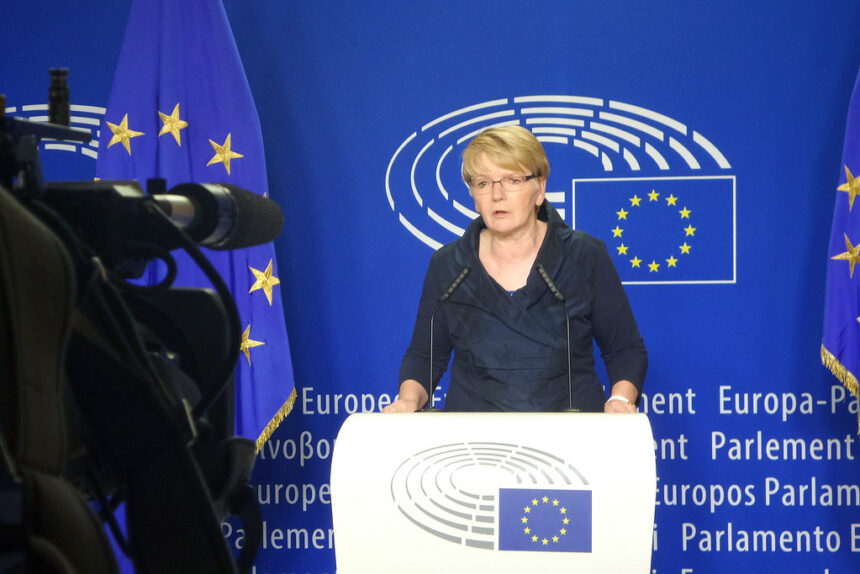Both the United Kingdom and European Union have taken steps to improve their relationship.
Keir starmer, the UK prime minister, will participate in an informal EU summit in early 2025. This will be his first invitation to attend since Brexit talks concluded in 2020.
The meeting’s focus will be on the defence and security of Europe, as it faces many global challenges.
As both the UK’s and Europe’s economies are currently trying to find their feet, a review of their relationship may provide them with more benefits than disadvantages.
Why is there a renewed interest in the military?
The UK and EU have shared interests due to the geopolitical instability.
Regional security is threatened by the wars in Ukraine, the Middle East and China, as well as rising tensions with North Korea and China.
Donald Trump’s return as president raises questions about NATO’s dependability and the new tariffs.
Brexit has left Europe without its biggest economies and most powerful militaries.
The UK’s influence in the world has been reduced by its departure from the EU.
Labour’s new government in 2024 sees improving EU relations as an effective way to tackle key challenges at home, such as migration, economic recovery and defense policy.
Labour’s ambitious reset plan
Labour’s agenda for foreign policy prioritizes EU relations. Prime Minister Starmer promises an “ambitious re-set.”
Ministers of importance have been engaged in diplomatic activity. Rachel Reeves met with EU Finance Ministers while David Lammy, the Foreign Secretary, held meetings with EU counterparts.
Starmer met with Ursula von der Leyen, the President of the European Commission in Brussels.
The UK is being integrated into the broader European objectives without having to reopen contentious Brexit questions.
Starmer’s Government seeks to collaborate in such areas as cross-border commerce and energy security, while maintaining regulatory autonomy.
What is at stake in terms of economics?
Since Labour came to power, the UK economy has been facing significant challenges.
According to Office for National Statistics, the growth of GDP stagnated between July 2024 and September 2024.
CEBR predicts that the UK’s economy will be the sixth largest in the world by 2039. However, its outlook is weak for the short term.
Labour’s policies on tax, such as a PS25-billion increase in National Insurance Contributions, has been criticized for possibly slowing the economic recovery.
In spite of these obstacles, UK performance could outpace European counterparts like Germany and France in the next 15 Years.
CEBR predicts that Germany’s GDP will shrink in comparison to UK, and the difference between the two countries is expected to narrow from 31 to 20 percent by the year 2039.
By the year 2020, it is expected that the UK will be 25 percent larger than France.
The Labour Government has focused its efforts on stimulating economic growth by implementing reforms in planning and investing public funds.
The UK’s economy has long suffered from structural problems that can be addressed by increasing housebuilding, modernizing infrastructure and reducing the cost of housing.
Security and Defense: A Common Priority
The reset is based on defense cooperation. The security environment in Europe has changed significantly over the last two years.
Russia continues to support the war in Ukraine, with nations such as Iran and North Korea.
Strengthening military partnership is important for both the UK as well as EU.
The UK is one of the few European military powers that can deploy significant forces internationally. It is therefore a key partner in EU-led initiatives on security.
Starmer’s participation at the summit in February signals that the UK is willing to participate to collective defence efforts, particularly as NATO’s outlook appears to be uncertain.
Role of regulatory reform
The Labour Party is also focusing on regulatory barriers to increase economic growth.
By January, the government wants reform proposals from regulators such as Ofgem and Ofwat.
The reforms are designed to promote a growth-friendly environment, while still respecting regulatory independence.
Starmer has criticised excessive bureaucracy and called it an obstacle to investment.
He pledged in a speech he gave to investors from around the world to eliminate outdated regulations which impede economic activity.
Critics argue, however, that certain rules seen as obstacles for the market are actually necessary.
Freedom of expression and public opinion
According to polling, citizens of the UK as well as EU countries are more interested in strengthening their ties with each other than governments.
Recent YouGov/Datapraxis polling for the European Council on Foreign Relations found that 55% of UK respondents believe closer engagement with EU is the best way for the UK to grow its economy. 68% of UK respondents favor the return of freedom of movement as a trade-off for access to single market.
Majorities of Germans and Poles support offering special access to the unified market for the UK to enhance security co-operation.
Sectoral agreements are a compromise that the Labour Government will accept, despite its insistence on not returning to the free movement of people or the single-market.
Youth mobility programmes, for example, could enable 18-30 year-olds who wish to study or work across the Channel.
In exchange, the UK may accept it in return for tangible benefits such as reciprocal recognition of professional qualifications and easier mobility for UK artists and entertainers.
Similarly, the negotiation of fishing rights could be used as a bargaining chip, linked to economic gains like food trade agreements that are more streamlined.
Why is it important to reset the UK and EU relationship?
Both opportunities and risks are associated with the UK-EU Reset.
One hand, stronger ties can help both parties address common challenges, ranging from geopolitical instabilities to trade barriers.
A better level of cooperation could also boost the EU’s influence in the world and benefit UK’s recovery.
There are also limits on how far each side will compromise.
It is highly unlikely that the UK will rejoin the customs union or single market, and the EU could be reluctant to make significant concessions in the areas of trade or immigration.
Labour’s call for a “reset” of the EU is tightly tied to their domestic agenda.
Success in these negotiations is crucial to the delivery of economic growth, migration management, and improved public services.
Labour is still facing political dangers at home. Brexiteers may be skeptical of any concessions made to the EU and view them as a betrayal.
Labour faces a difficult task in this regard, as it must frame all compromises to be positive for British interests and avoid backlash from British voters who are resistant to EU influence.
Act over words
Even though both parties are in good will, progress is only possible if there are clear priorities set and compromises made.
Negotiations could be stalled by the EU’s doubts about UK intentions, and Labour’s hesitation to articulate fully the trade-offs.
Both sides need to go beyond the symbolic gestures and deliver real benefits to trade, defense, and energy.
The UK’s and Europe’s reset for 2025: What’s on the line for their economies in this post? This post may change as new information becomes available
This site is for entertainment only. Click here to read more






